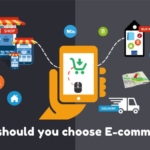The best e-commerce platforms. Powering successful online stores.
Nowadays, electronic commerce is growing rapidly. Building and maintaining a large online store requires a strong technological foundation. E-commerce platforms play a crucial role in providing the tools and features needed to create secure, user-friendly websites. This platform simplifies the business development process, focusing on the purchase process.
In this article, we will explore some of the best E-Commerce Platforms that power successful online stores.
1. WooCommerce
WooCommerce, a WordPress module, emerges as one of the most popular and popular global e-commerce platforms. Known for its simplicity and flexibility, WooCommerce seamlessly integrates with existing WordPress websites, turning them into functional online stores. It offers a wide library of plugins that meet different business needs, from small boutiques to large enterprises. In addition, WooCommerce offers extensive personalization options, making it an ideal choice for businesses that have created a unique online presence.
2. Shopify
Shopify is a comprehensive hosted e-commerce platform that empowers entrepreneurs to create and manage their online stores with ease. Known for its user-friendly interface and hassle-free setup process, Shopify is an easy choice for businesses of all sizes. The platform handles technical aspects such as hosting, security, and updates, allowing merchants to focus on product management and customer engagement. With a host of customizable themes and a thriving app ecosystem, Shopify provides a step-by-step path to success for growing businesses and helps them gain a competitive edge.
3. Magento
Magento is an open-source e-commerce platform that caters to businesses with complex requirements and the need for extensive customization. With a powerful set of features, including multi-store support, powerful SEO capabilities, and advanced product management, Magento is favored by large enterprises and fast-growing businesses. Its modular architecture allows developers to extend functionality through custom modules, making it highly flexible. However, due to its extensive features and complexity, Magento may require more significant technical expertise for configuration and maintenance than other platforms.
4. BigCommerce
BigCommerce is another popular e-commerce solution known for its ease of use and add-on modules. Designed to accommodate businesses of all sizes, BigCommerce offers a variety of built-in tools for inventory management, order processing, and SEO optimization. The platform enables adaptation to mobile devices, ensuring that online stores look and perform excellently on all devices. BigCommerce facilitates quick store setup without compromising functionality. It offers a user-friendly interface and a wide range of structures.
5. OpenCart
OpenCart is an easy-to-use e-commerce platform that caters to small and medium-sized businesses. It provides a simple yet effective administration panel for managing products, customers, and orders. OpenCart offers a variety of modules and templates to extend the platform’s capabilities and customize the look of your online store. While it may not be as feature-rich as some other platforms, OpenCart’s simplicity and performance make it a cost-effective option for businesses just starting out in the eCommerce space.
Conclusion
Choosing the right e-commerce platform is a critical decision that significantly impacts the success of an online store. Each of the major e-commerce frameworks mentioned in this blog post comes with its own strengths and unique advantages, catering to different business needs and technical requirements. WooCommerce and Shopify are excellent choices for businesses looking for simplicity and ease of use, while Magento offers powerful customization for enterprises with complex demands. BigCommerce strikes a balance between usability and comprehensive features, making it suitable for businesses of various sizes. Lastly, the simplicity and ease of OpenCart make it an appealing option for small and medium-sized businesses.
When choosing an e-commerce platform, it is essential to consider factors such as business growth, customization options, budget, and technical support. By leveraging the power of these leading e-commerce platforms, businesses can build a strong online presence, provide exceptional shopping experiences, and stay competitive in the dynamic world of e-commerce.


